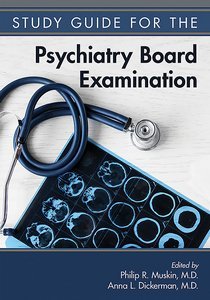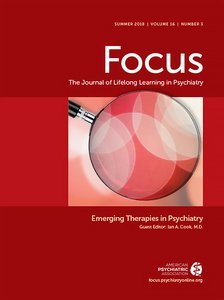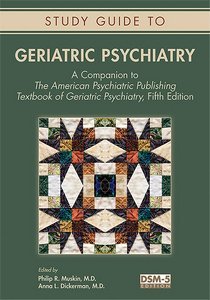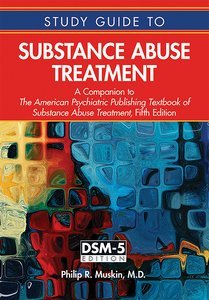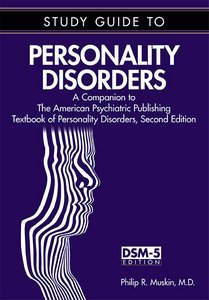Study Guide for the Psychiatry Board Examination
View Pricing
Description
Psychiatrists and residents are faced with the important—but what may feel overwhelming—task of refreshing their knowledge of the whole of psychiatric practice, typically while remaining engaged in full-time clinical activity. Psychiatrists will find the logical structure, substantive questions, and thorough explanations provided by the Study Guide for the Psychiatry Board Examination to be as reassuring as they are educational. Although readers are advised to consult a range of resources in preparation for the examination, this guide is indispensable. It is the first and only guide to reflect the revisions contained in DSM-5, and it will ably assume a primary role in the study and review process.
The guide is designed for maximum usefulness, with specific features and attributes to support knowledge recall and successful examination performance.
- The authors are from a cross-section of accomplished students, fellows, and junior and senior faculty, all of whom have faced or will face the board examination and who understand its importance to the profession.
- Topics were determined by the American Board of Psychiatry and Neurology Certification Examination in Psychiatry 2015 Content Blueprint.
- The approximately 400 questions were formulated from information extracted from widely available American Psychiatric Publishing textbooks and accurately reflect the accepted psychiatric knowledge base.
- Each multiple choice question is followed by an explanation of why the correct answer is correct and the others are incorrect, and every question and explanation is referenced, directing the reader to the primary material for more in-depth learning and study.
- The volume was designed as a study guide for both the initial psychiatry board examination and the recertification examination.
The process of working through the study guide will allow the reader to identify areas of strength and weakness, initiate further study, and test and retest knowledge, ultimately preparing for the examination's rigors. Only the Study Guide for the Psychiatry Board Examination offers support for the new, DSM-5—compatible examination, and that alone renders it essential.
Contents
- Contributors
- Preface
- Part I: Questions
- Chapter 1. Anthropology/Sociology/Ethology/Psychology
- Chapter 2. Anxiety Disorders
- Chapter 3. Bipolar Disorders
- Chapter 4. Dangerousness
- Chapter 5. Depressive Disorders
- Chapter 6. Development: Adulthood
- Chapter 7. Development: Infancy Through Adolescence
- Chapter 8. Developmental Issues in Older Adults
- Chapter 9. Diagnostic Procedures
- Chapter 10. Disruptive Behavior Disorders
- Chapter 11. Dissociative Disorders
- Chapter 12. Elimination Disorders
- Chapter 13. Epidemiology and Public Policy: Health Care Economics/Public Policy Issues
- Chapter 14. Feeding and Eating Disorders
- Chapter 15. Law
- Chapter 16. Mental Status
- Chapter 17. Neurocognitive Disorders
- Chapter 18. Neurodevelopmental Disorders
- Chapter 19. Nonpharmacological Somatic Treatments
- Chapter 20. Obsessive-Compulsive and Related Disorders
- Chapter 21. Paraphilic Disorders
- Chapter 22. Personality Disorders
- Chapter 23. Principles of Psychopharmacology
- Chapter 24. Professionalism
- Chapter 25. Psychiatric Consultation
- Chapter 26. Psychiatric Interview
- Chapter 27. Psychoanalysis
- Chapter 28. Psychological Testing
- Chapter 29. Psychopharmacology
- Chapter 30. Psychosocial Interventions
- Chapter 31. Psychotherapies
- Chapter 32. Research/Biostatistics
- Chapter 33. Schizophrenia Spectrum and Other Psychotic Disorders
- Chapter 34. Sexual Dysfunction/Gender Dysphoria
- Chapter 35. Sleep-Wake Disorders
- Chapter 36. Somatic Symptom and Related Disorders
- Chapter 37. Special Topics: Seclusion/Risk Management/Abuse and Neglect
- Chapter 38. Spirituality
- Chapter 39. Substance-Related and Addictive Disorders
- Chapter 40. Suicidality
- Chapter 41. Trauma- and Stressor-Related Disorders
- Part II: Answer Guide
Contributors
- Iqbal Ike Ahmed, M.D., FRCPsych (U.K.)
Alanna Chait, M.D.
Rachel Caravella, M.D.
Stephanie Cheung, M.D.
Adam Critchfield, M.D.
Catherine Daniels-Brady, M.D.
Meena Dasari, Ph.D.
Anna L. Dickerman, M.D.
Elizabeth Evans, M.D.
Christina Kitt Garza, M.D.
Liliya Gershengoren, M.D.
Jennifer S. Harrington-Knopf, B.A.
Yael Holoshitz, M.D.
Sarah Richards Kim, M.D.
Daniel Knoepflmacher, M.D., M.F.A.
John Luo, M.D.
Adrienne D. Mishkin, M.D., M.P.H.
Philip R. Muskin, M.D., M.A.
Sara Siris Nash, M.D.
Daniel P. Notzon, M.D.
Divy Ravindranath, M.D., M.S.
Michelle Riba, M.D., M.S.
Amy Rosinski, M.D.
Lisa S. Seyfried, M.D.
Yvette Smolin, M.D.
Oliver M. Stroeh, M.D.
Wendy L. Thompson, M.D.
Thomas E. Ungar, M.D., M.Ed., CCFP, FCFP, FRCPC, DABPN
About the Authors
Philip R. Muskin, M.D., is Professor of Psychiatry at Columbia University Medical Center, Chief of Consultation-Liaison Psychiatry at New York-Presbyterian Hospital/Columbia Campus, and on the Faculty of Columbia University Center for Psychoanalytic Training and Research in New York, New York.
Anna L. Dickerman, M.D., is Assistant Professor of Clinical Psychiatry at Weill Cornell Medical College and an Assistant Attending Psychiatrist, Psychiatry Consultation-Liaison Service at New York-Presbyterian Hospital/Weil Cornell Medical Center, New York, New York.
Related Products
Carousel Control - items will scroll by tabbing through them, otherwise arrows can be used to scroll one item at a time
